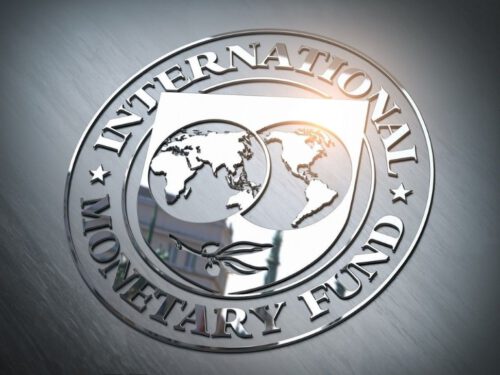Article
IMF Begins Review of Unjust Surcharge Policy

Article
Fact-based, data-driven research and analysis to advance democratic debate on vital issues shaping people’s lives.
Center for Economic and Policy Research
1611 Connecticut Ave. NW
Suite 400
Washington, DC 20009
Tel: 202-293-5380
Fax: 202-588-1356
https://cepr.net
Earlier this month, Bloomberg broke the story that the International Monetary Fund (IMF) has finally begun to review its surcharge policy. Surcharges are special fees that the IMF levies on highly indebted 1 countries in addition to regular interest payments and service fees. CEPR has been calling for an end to surcharges for over three years, along with prominent economists and hundreds of civil society organizations. Our research has demonstrated that surcharges are counterproductive, unfair, and unnecessary. The Fund is expected to make a decision on surcharges ahead of its Annual Meetings in October.’
Changing this policy would require approval from a 70 percent majority of voting power at the IMF’s Executive Board. But the United States holds the largest voting share, with 16.5 percent, and has been reluctant to change the surcharge policy. At a recent House Financial Services Committee hearing on the state of the international financial system, Representative Rashida Tlaib (D-MI) questioned Treasury Secretary Janet Yellen, asking, “Do you believe that developing countries suffering through a perfect storm of global crises … should be required to pay these fees on top of the interest they pay on their debt?”
In response, Secretary Yellen clarified that the US supports the IMF’s decision to review its surcharge policy, but qualified this with the comment that “the surcharges framework … is important to create appropriate incentives to repay the IMF in a timely way and to contain borrowings.”
This comes amid concerns voiced by Treasury Undersecretary Jay Shambaugh that low- and middle-income countries are now experiencing net outflows to creditors. These outflows are, in large part, a reflection of the historic debt crisis the developing world is currently facing. Developing countries’ hard currency reserves are dwindling rapidly, pushing many toward balance of payment crises. IMF surcharges further deplete hard currency reserves precisely when countries need them most. Since Argentina defaulted on its debts in May 2020, it has paid the IMF $3.77 billion in surcharges.
Contrary to Yellen’s remarks, CEPR has found no evidence for the claim that surcharges incentivize debtor countries to repay the IMF in a timely manner. Instead, surcharges increase the likelihood of nonrepayment because they increase the debt burden of countries that are already heavily indebted. Debtor countries don’t need additional disincentives from IMF borrowing, as IMF programs already carry significant stigma and come with onerous conditions. Given this, countries only turn to the IMF when they are in dire need, often as a result of exogenous shocks such as the COVID-19 pandemic, the war in Ukraine, and the climate crisis.
The claim that surcharges can disincentivize countries from relying on IMF lending is belied by the fact that the number of countries paying surcharges has nearly tripled since before the COVID-19 pandemic from eight to 22 as pandemic spending and subsequent global economic shocks have pushed countries into a historic debt crisis.
Surcharges are no small cost either. CEPR estimates that, for the five countries paying the most in surcharges, these payments alone will amount to more than a third of the total interest and fees they owe to the IMF. In the last five years, debtor countries have paid the IMF $7 billion in surcharges, and the Fund is expected to charge an additional $9.8 billion in surcharges over the next five years. In some cases, this puts the IMF’s effective lending rate for highly indebted countries at over 8 percent — closer to what private lenders would charge than the rates typically expected of multilateral financial institutions.
Surcharges exacerbate challenges faced by countries already dealing with dire climate, security, and health crises. Devastating floods accompanying Cyclone Remal last month have already taken 30 lives in Sri Lanka, while over 6,000 people have been forced to flee their homes and over 12,000 homes have been damaged. CEPR research shows that Sri Lanka is expected to pay $308 million in surcharges over the next decade.
War-ravaged Ukraine is on track to pay a whopping $1.8 billion in surcharges in the next five years, even as its economy remains 25 percent below its 2021 level. Egypt, which is now experiencing a food crisis precipitated by events beyond its control, is expected to spend $699 million in surcharges over the next decade.
Members of Congress have called for an end to surcharges since 2022, when the House of Representatives passed legislation directing the IMF to review its surcharge policy in consultation with countries paying surcharges. More than two years later, the IMF has finally agreed to review its surcharge policy.
Surcharges are not just unfair; they are also unnecessary. The IMF’s capital base is now well-funded. By the Fund’s own estimates, it reached its precautionary balances target in April 2024, and will remain above target for years even without revenue from surcharges.
The IMF is mandated with the task of preserving financial stability globally. Instead, it is driving countries facing war, famine, and climate disasters further into debt. Ending surcharges would bring the Fund closer into line with its own Articles of Agreement, its broader mandate, and the urgent needs of developing countries in a time of growing, and in some cases unprecedented, challenges.